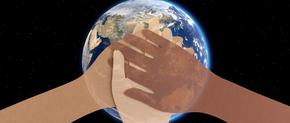The views expressed in our content reflect individual perspectives and do not represent the authoritative views of the Baha'i Faith.
What stands in the way of rapprochement between science and religion is not so much a dominant science, but a moribund religion, a religion which has forgotten kindness, compassion, and spiritual discernment.
True religion calls on humanity to defend those subtle and ineffable qualities of one’s subjective choosing, one’s commitment to virtues by any other name, which animate the life of a faithful mind.
RELATED: Answering Two Major Scientific Challenges to Religion
Paul Lample, member of the Universal House of Justice – the democratically-elected global administrative body – identifies the essence of the legendary conflict between science and religion as one between objectivity and subjectivity, respectively, those two capacities of human thought itself, in The Journal of Baha’i Studies:
At the heart of the assumptions on which science rests is the belief that the universe operates in a lawful manner which the mind is capable of objectively discerning in a reliable, if fallibilistic, way. The demonstrable value of science strengthens our faith in such capacities. At the same time, we have increasingly come to view with suspicion and doubt those capacities of the mind that provide us with perspectives on subjective and normative dimensions of reality, capacities that are perhaps no less essential for our survival and flourishing. Perhaps we can learn to trust both, so long as these inherent capacities are properly channeled.
I have to think that his reference to “subjectivity and the normative dimensions of reality” is meant to evoke the subtle qualities of the soul and the domain of human spirituality as perpetuated and protected by religion, those aspects of human being which refuse to be quantified by an insatiably objective mind.
If I am understanding this point correctly, then we must reclaim and strengthen our subjective spiritual consciousness, before it withers and falls away, before science does what it has done since the beginning of the scientific revolution four hundred years ago, and condemn subjectivity and those subtleties of the soul to irrelevancy.
The objectivity and exactitude of science is imperative, but so is the authority of love, for example, for its own sake, and for its indispensable role in humanizing the mind, as well as its power to affect human history. Religion’s ability to say such a thing and to defend itself must now find parity with science’s ability to innovate and to change the world technologically.
Indeed, religion must learn to sing of those subtle mysteries of the heart and soul just as a songbird learns to sing among the orchards of spring, of the mind’s need to be balanced between objectivity and subjectivity, its ability to both think and to feel, to know and to love, of the mind’s necessity to be whole and coordinated.
But unfortunately, religion has compromised itself on the public stage and surrendered its authority, according to Lample:
… humanity has made its scientific turn centuries ago, crossing the threshold to rational maturity that is well substantiated and continually refined, religion has not yet been similarly transformed, and remains in a quagmire of superstition, prejudice and immaturity that is too often detached from truth and from proven worth in engendering justice and human well-being.
If this trend continues, we will become caricatures of our divinely purposed selves, psychically off-balance, perhaps even crippled spiritually and estranged from ourselves, if not from our Creator. Without the spiritual, subjective presence of man’s mind in its full nobility, science is likely to become an entirely materialistic enterprise, while religion continues to degrade to an empty husk, making the reconciliation of science and religion a futile concept.
Baha’u’llah, in his Epistle to the Son of the Wolf, enjoined the rulers of humankind, including the “divines and the wise,” to:
… uphold the cause of religion, and to cleave unto it. Religion is verily the chief instrument for the establishment of order in the world and of tranquility amongst its peoples. The weakening of the pillars of religion hath strengthened the foolish and emboldened them and made them more arrogant. Verily I say: The greater the decline of religion, the more grievous the waywardness of the ungodly. This cannot but lead in the end to chaos and confusion. Hear Me, O men of insight, and be warned, ye who are endued with discernment!
All Baha’i principles go about the work of healing what is in conflict, broken, and needs to be unified. This one core Baha’i principle of harmony between science and religion is no different. It reaches into the depths of one’s being, where it prompts self-examination and asks us to adjust how we think and feel, if we are ever to succeed in uniting the spheres of our mind, let alone the hemispheres of the world.
This principle engenders a revolutionary new form divinely designed to catch and canalize the divergent, mutually repelling energies of both science and religion, both objectively and subjectively. As such it strikes deep into thought itself, where it plants a seed, set to send up a tree of love to fill the mind of even the most brilliant and objective-minded scientist, let alone take root in the withered heart of a bewildered believer.
RELATED: Finding the Hidden Mysteries in Ourselves – and In the Universe
Otherwise, if we acculturate ourselves to an ideal scientific mind devoid, or disdainful, of its spiritual responsibilities and spiritual instincts, we will have lost the mind’s potential for an expanded consciousness, altogether. Look around for evidence of just such an impending disaster.
The Baha’i teachings urge us to merge and marry objectivity and subjectivity until they become not merely complementary, but simultaneous and virtually the same, and generative of a tree-like, sprawling new mind – indeed, a mind that is both meticulous and discriminating but also exorbitant and generous, scientific and exacting but also wide open and seriously in love, capable of oneness thinking.
Thus the marriage of these two systems of knowledge takes place precisely on the spiritual, psychological, and intellectual threshold to wholeness of being, in preparation for one vast enterprise of truth-seeking, representing the dissolution of dichotomous thinking altogether, and the coming of age of all of us.
Please know that it is in the Baha’i Covenant, finally, where that consummating marriage of science and religion takes place definitively, where one learns to love God subjectively, and to act according to His laws and precepts objectively. In this new place where science and religion become virtually indistinguishable one from the other, where each of us comes to possess a unified mind, a first-person spiritual consciousness, empowered now to enter the work of the world with the vitality of love married to a capacity for critical thinking, we each gain the strength and self-confidence to speak up about such things, and to unite the mind and the soul.
Bradford Miller’s most recent book is Sickness, Death, and Resurrection of Holden Caulfield, available on Amazon.

















Comments
Sign in or create an account
Continue with Facebookor